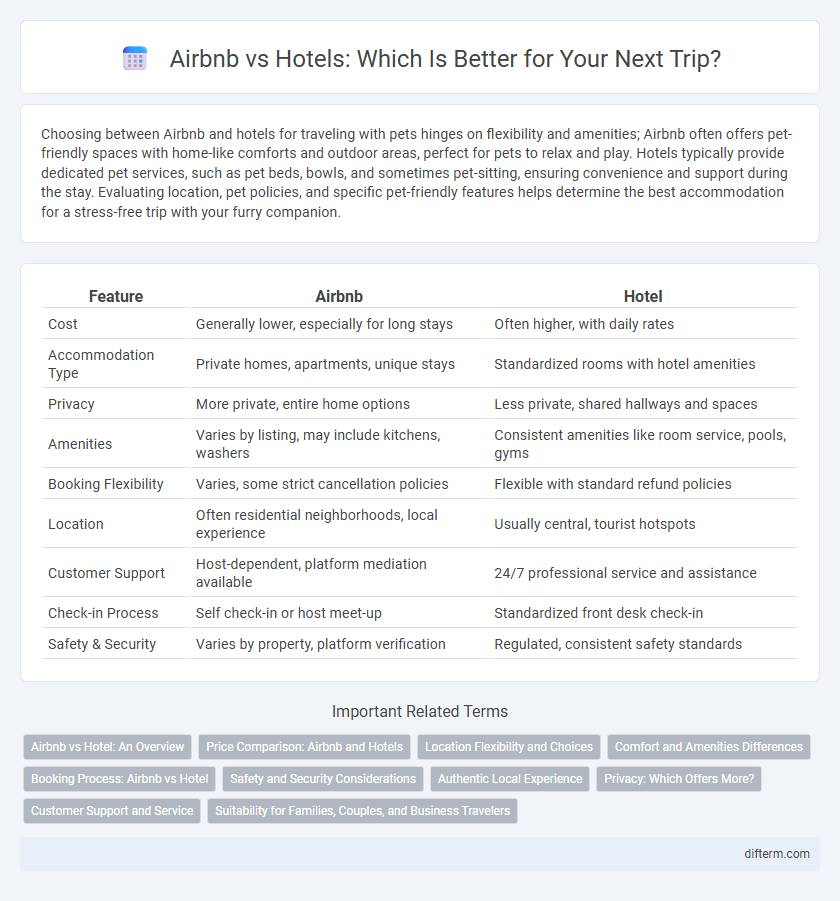Choosing between Airbnb and hotels for traveling with pets hinges on flexibility and amenities; Airbnb often offers pet-friendly spaces with home-like comforts and outdoor areas, perfect for pets to relax and play. Hotels typically provide dedicated pet services, such as pet beds, bowls, and sometimes pet-sitting, ensuring convenience and support during the stay. Evaluating location, pet policies, and specific pet-friendly features helps determine the best accommodation for a stress-free trip with your furry companion.
Table of Comparison
| Feature | Airbnb | Hotel |
|---|---|---|
| Cost | Generally lower, especially for long stays | Often higher, with daily rates |
| Accommodation Type | Private homes, apartments, unique stays | Standardized rooms with hotel amenities |
| Privacy | More private, entire home options | Less private, shared hallways and spaces |
| Amenities | Varies by listing, may include kitchens, washers | Consistent amenities like room service, pools, gyms |
| Booking Flexibility | Varies, some strict cancellation policies | Flexible with standard refund policies |
| Location | Often residential neighborhoods, local experience | Usually central, tourist hotspots |
| Customer Support | Host-dependent, platform mediation available | 24/7 professional service and assistance |
| Check-in Process | Self check-in or host meet-up | Standardized front desk check-in |
| Safety & Security | Varies by property, platform verification | Regulated, consistent safety standards |
Airbnb vs Hotel: An Overview
Airbnb offers unique, local experiences by providing diverse accommodations ranging from apartments to villas, often at competitive prices compared to hotels. Hotels guarantee consistent standards, amenities such as daily housekeeping, and 24/7 customer service, appealing to travelers seeking convenience and reliability. Choosing between Airbnb and hotels depends on preferences for personalized stays versus standardized services and location-specific benefits.
Price Comparison: Airbnb and Hotels
Airbnb often offers more competitive pricing than hotels, especially for longer stays and group accommodations, providing guests with access to full kitchens and larger living spaces at lower costs. Hotels may charge higher rates due to amenities, daily services, and prime locations, but frequently include added conveniences such as daily housekeeping and 24/7 front desk support. Price comparison tools show Airbnb's dynamic pricing can fluctuate, while hotel rates tend to be more stable but sometimes less flexible for budget travelers seeking deals.
Location Flexibility and Choices
Airbnb offers unparalleled location flexibility with options ranging from urban apartments to remote countryside homes, enabling travelers to immerse themselves in diverse environments. Hotels, by contrast, predominantly concentrate in commercial hubs and tourist centers, limiting choices for those seeking unique or offbeat locales. This variety in Airbnb accommodations allows for more personalized and niche travel experiences tailored to specific geographic preferences.
Comfort and Amenities Differences
Airbnb accommodations often provide personalized comfort with home-like amenities such as full kitchens, living spaces, and unique interior designs tailored to local culture. Hotels typically offer standardized services like daily housekeeping, room service, and on-site facilities such as gyms, pools, and concierge support. The choice between Airbnb and hotels depends on whether travelers prioritize the flexibility of a private residence or the consistent convenience of professional hospitality.
Booking Process: Airbnb vs Hotel
Airbnb's booking process offers flexible check-in times and direct communication with hosts, enhancing personalized travel planning. Hotels provide instant booking confirmation with standardized procedures, often including concierge assistance to streamline guest needs. Both platforms integrate user reviews, but Airbnb emphasizes local experiences while hotels focus on professional service consistency.
Safety and Security Considerations
Airbnb properties offer tailored safety features such as smoke detectors and secure locks often verified by host reviews, though standards vary by individual listing. Hotels provide consistent security measures including 24/7 front desk surveillance, security personnel, and controlled access to guest rooms. Travelers prioritizing guaranteed safety protocols may prefer hotels, while those seeking unique, vetted accommodations can utilize Airbnb's rating system to assess host reliability and property security.
Authentic Local Experience
Airbnb accommodations provide travelers with an authentic local experience by offering stays in residential neighborhoods, allowing guests to immerse themselves in the culture and daily life of the area. Unlike hotels, which often prioritize uniformity and standardized services, Airbnb hosts frequently share personal recommendations for hidden gems, local eateries, and community events. This personalized access creates a deeper connection to the destination, enhancing the overall travel experience with cultural authenticity.
Privacy: Which Offers More?
Airbnb accommodations often provide greater privacy by offering entire homes or apartments, allowing guests exclusive access without shared spaces. Hotels, on the other hand, typically have communal areas such as lobbies and dining rooms, which may reduce the feeling of seclusion. For travelers prioritizing privacy, Airbnb's private lodging options generally outperform traditional hotel settings.
Customer Support and Service
Airbnb offers personalized customer support through hosts who provide local insights and 24/7 assistance via the platform's messaging system. Hotels typically feature professional, on-site staff available around the clock, including concierge and room service, ensuring immediate resolution of guest needs. While Airbnb emphasizes unique, tailored experiences, hotels excel in consistent, standardized service quality across locations.
Suitability for Families, Couples, and Business Travelers
Airbnb offers diverse accommodation options ideal for families seeking space and flexibility, often including kitchens and multiple bedrooms, whereas hotels provide standardized services and amenities that appeal to business travelers valuing convenience and reliable facilities. Couples may prefer Airbnb for privacy and unique local experiences, while hotels guarantee consistent service and added luxuries like room service and concierge support. Business travelers benefit from hotels' central locations and business-oriented amenities, while families gain from Airbnb's home-like environment suited for longer stays.
Airbnb vs hotel Infographic

 difterm.com
difterm.com